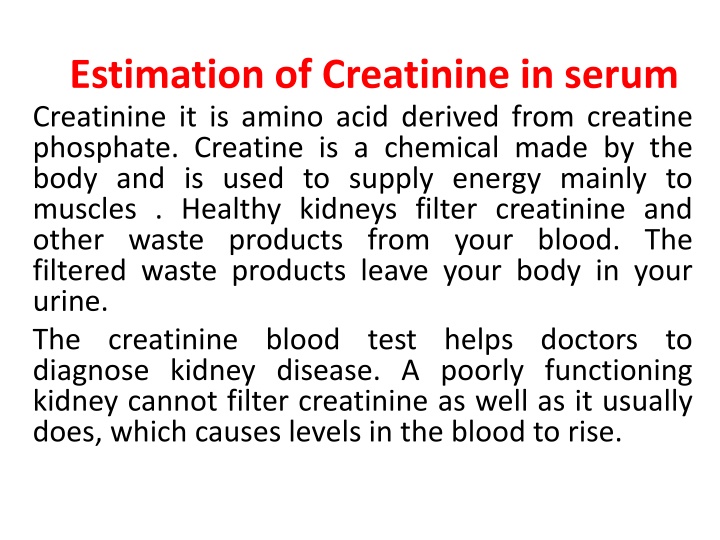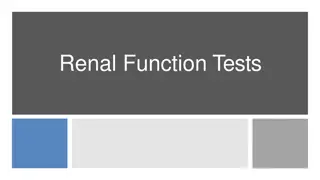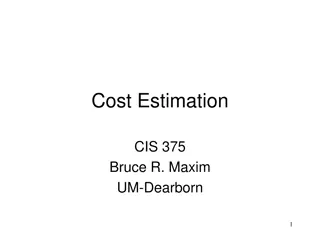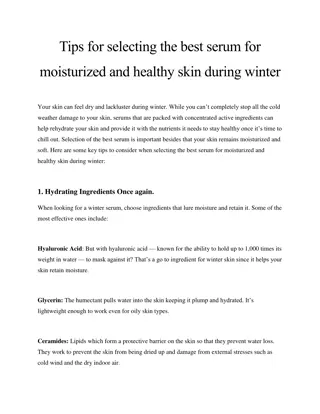Estimation of Creatinine in serum
Creatinine is a vital amino acid marker for kidney health. Learn about its role, normal levels, causes of high/low levels, and influencing factors. Proper management is crucial for overall well-being.
Download Presentation

Please find below an Image/Link to download the presentation.
The content on the website is provided AS IS for your information and personal use only. It may not be sold, licensed, or shared on other websites without obtaining consent from the author.If you encounter any issues during the download, it is possible that the publisher has removed the file from their server.
You are allowed to download the files provided on this website for personal or commercial use, subject to the condition that they are used lawfully. All files are the property of their respective owners.
The content on the website is provided AS IS for your information and personal use only. It may not be sold, licensed, or shared on other websites without obtaining consent from the author.
E N D
Presentation Transcript
Estimation of Creatinine in serum Creatinine it is amino acid derived from creatine phosphate. Creatine is a chemical made by the body and is used to supply energy mainly to muscles . Healthy kidneys filter creatinine and other waste products from your blood. The filtered waste products leave your body in your urine. The creatinine blood test helps doctors to diagnose kidney disease. A poorly functioning kidney cannot filter creatinine as well as it usually does, which causes levels in the blood to rise.
The production of creatinine depends on muscle mass and the amount of creatinine and also depends on the extent of glomerular filtration in the kidney. Causes For High Levels Some of the causes of high creatinine levels are: 1. Chronic kidney disease When kidneys are damaged, they have trouble removing creatinine from the blood and levels rise. 2. Kidney obstruction A blockage in the flow of urine, such as kidney stone, could cause kidney obstruction which might raise the level of creatinine.
3. Dehydration Severe dehydration is a risk factor for kidney injury, which will affect creatinine levels. 4. Increased consumption of protein What a person eats can have a significant impact on creatinine levels. For example, proteins and cooked meat contain creatinine, so adding extra protein to the diet through supplements can cause high creatinine levels. 5. Intense exercise Creatine is present in the muscles and helps them produce energy. Rigorous exercise can increase creatinine 6. Certain medications Antibiotics, such as trimethoprim, and cimetidine, can cause a temporary increase in measured serum creatinine levels.
Causes For Low Levels 1. Low muscle mass low muscle mass can result in low levels of creatinine. Older people are more at risk as muscle mass declines with age. Malnutrition can also cause low muscle mass and low creatinine levels. 2. Pregnancy Pregnancy causes an increase in blood flow to the kidney leading to increased urine production and faster elimination of creatinine, leading to lower levels. 3. Extreme weight loss Weight loss can result in the reduction of muscle mass, leading to low levels of creatinine.
Normal level: Men: The proportion of natural creatine have higher than in women, because they have a larger muscle mass and stronger, so the proportion of creatinine have a natural range of 0.6-1.2 mg\dl, in adult males. For women: In adult women it ranges from 0.5-1.1 mg\dl Vegetarians: They have a low creatinine ratio compared to people who eat meat. Men with muscle: the ratio is generally higher. Older people: The ratio is generally lower. Infants: Their normal ratio starts at 0.2 mg\dl and starts to increase as their muscles develop. People with one kidney: the normal ratio is 1.8 or 1.9 mg\dl























